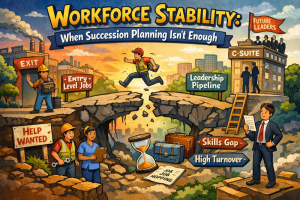The difference between a thriving business and one that struggles often comes down to one fundamental factor: having the right people in the right positions at the right time. Yet too many companies treat talent acquisition as an afterthought, scrambling to fill positions only after critical roles become vacant. This reactive approach doesn’t just cost money—it can cripple operations and derail growth plans.
The Real Price of Poor Hiring Decisions
Every hiring decision carries weight, but the stakes are particularly high for key positions. A poor hire in a leadership role can cascade through an entire organization, affecting team morale, productivity, and strategic direction. The financial impact extends far beyond salary and benefits. Consider the cost of lost productivity during the search period, the resources spent training someone who ultimately doesn’t work out, and the opportunity cost of projects delayed or derailed. As a rule of thumb, this loss generally equates to about 40% of the first-year salary.
In manufacturing and industrial settings, these costs multiply exponentially. When a plant manager or operations director position sits vacant for months, production schedules suffer, safety protocols may be compromised, and customer relationships can be damaged. The ripple effects touch every aspect of the business, from supply chain efficiency to bottom-line profitability.
The Skilled Trades Talent Gap: A Growing Crisis
While executive searches get attention, the real talent crisis lies in skilled trades positions. Finding a qualified VP of Sales might take time and careful vetting, but at least there’s typically a substantial candidate pool to draw from. Try finding an experienced industrial maintenance technician, a certified welder, or a skilled CNC machinist, and you’ll discover a very different reality.
The skilled trades shortage affects virtually every industry, but manufacturing and industrial companies feel it most acutely. These roles require specific technical competencies that can’t be taught overnight, and the candidate pool continues to shrink as experienced workers retire faster than new ones enter the field. Unlike many white-collar positions where skills can be developed through general education and on-the-job training, skilled trades demand specialized knowledge and hands-on experience that takes years to develop.
This scarcity means industrial companies often face extended vacancies in critical positions. A single unfilled electrician role can halt production lines. An empty maintenance supervisor position can compromise safety protocols and equipment reliability. The domino effect can shut down entire operations, making these “lower-profile” positions some of the most strategically important hires a company will make.
Building Robust Talent Pipelines
Smart companies don’t wait for positions to open before thinking about bench strength and succession planning. They maintain ongoing relationships with potential candidates, even when they’re not actively hiring. This pipeline approach ensures that when key personnel move on—and they will—there are qualified candidates ready to step in quickly.
Effective talent pipeline management requires consistent effort and strategic thinking. It means understanding which roles are most critical to operations, identifying potential successors both internally and externally, and maintaining regular contact with promising candidates. It also means recognizing that different types of positions require different pipeline strategies. The approach for building a pool of potential plant managers differs significantly from developing a network of skilled welders or machinists.
For manufacturing and industrial companies, pipeline development should extend beyond traditional recruiting channels. Building relationships with trade schools, apprenticeship programs, and technical colleges creates pathways for new talent. Partnering with industry associations and participating in trade events helps maintain visibility among experienced professionals who might be open to new opportunities.
The Traditional Recruiting Model Problem
Here’s where the industry needs a reality check: traditional recruiting models are fundamentally broken and work against your best interests.
The Retainer Model (25-30% of the annual salary in fees) provides full-service recruiting including sourcing, screening, and interviewing, but creates perverse incentives. Retainer recruiters are incentivized to fill positions quickly rather than find the best candidates. They focus on easy placements that generate fast fees rather than investing time in challenging searches or building long-term relationships. The model encourages quantity over quality, speed over thoroughness. When recruiters get paid regardless of placement success, they naturally prioritize their easiest searches over your most critical needs.
The Contingency Model (10-15% of the annual salary in fees) appears more cost-effective but essentially delivers glorified resume services. Contingency recruiters typically provide a stack of resumes and walk away, leaving your internal team to handle all the actual recruiting work—screening, interviewing, reference checks, and negotiation. You’re still paying substantial fees while doing most of the recruiting work yourself. This approach shifts the burden and risk to your team without providing the strategic partnership and expertise you need for critical hires.
Both models mean you’re essentially subsidizing unsuccessful searches for other clients. Those fees aren’t just covering the work on your search – they’re covering all the searches that didn’t result in placements or didn’t meet expectations. You’re paying inflated rates to support business models that don’t align with your goals.
A Better Approach: Value-Based Talent Acquisition
At Empirical, we’ve abandoned both the retainer and contingency fee structures because they don’t serve our clients’ best interests. Instead, we work on a value-based model that aligns our success with yours. We ARE NOT trying to make quick placements to generate fees. We ARE focused on finding the right people for your specific needs and building sustainable talent pipelines that serve your long-term goals.
The financial benefits are immediate and substantial. While traditional contingency firms charge 25-30% of first-year salary, our value-based approach typically results in fees of just 7-9% of salary. That’s not a minor difference; it’s transformational. For a $100,000 position, you’re looking at $7,000-9,000 versus $25,000-30,000. The savings compound quickly across multiple hires, freeing up budget for other strategic investments.
This approach allows us to invest time in understanding your business, your culture, and your specific requirements. We can pursue difficult searches for specialized roles such as skilled trades positions without worrying about whether we’ll get paid for our efforts. We can build ongoing relationships with potential candidates even when you’re not actively hiring, creating the pipeline infrastructure that prevents talent shortages from becoming operational crises.
The Strategic Imperative
Talent acquisition isn’t a support function—it’s a strategic capability that directly impacts your ability to execute business plans and respond to market opportunities. Companies that treat it as such, investing in proper pipeline development and working with partners who share their long-term perspective, consistently outperform those who take a reactive, transaction-based approach.
The choice is clear: continue paying inflated contingency fees for reactive recruiting, or invest in strategic talent acquisition that builds competitive advantage. Your operations, your growth plans, and your bottom line depend on getting this right.
Don’t let talent shortages become the constraint that limits your success. The right people, in the right positions, at the right time – that’s how winning companies are built.
This blog was penned by Laurie Beasley, Director of Human Resources at Empirical. Want to find out more about how Empirical works in the talent acquisition space? Have some recruiting challenges within your organization and want to get some ideas on how to tackle them? Reach out to Laurie at lbeasley@thinkempirical.com.



